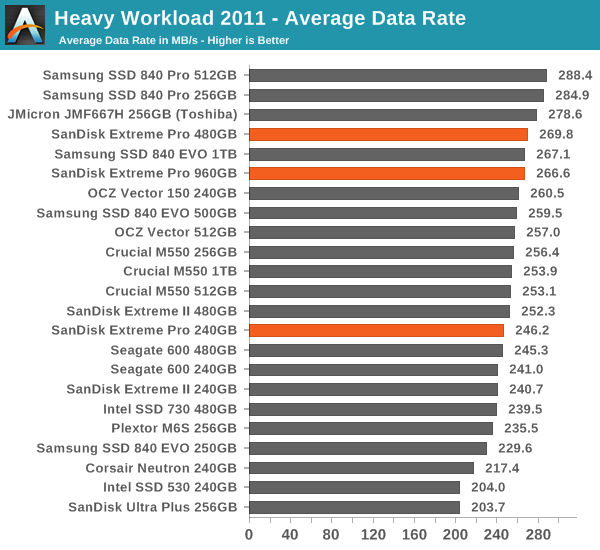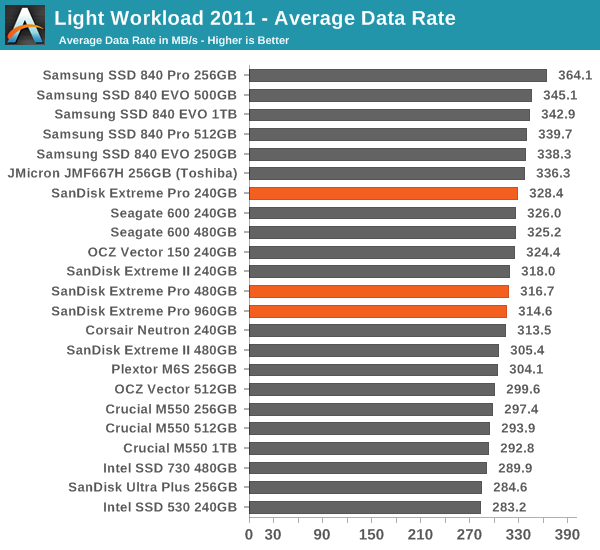SanDisk Extreme Pro SSD (240GB, 480GB & 960GB) Review: The Fastest Just Got Faster
by Kristian Vättö on June 16, 2014 4:00 PM EST- Posted in
- Storage
- SSDs
- SanDisk
- Extreme Pro
AnandTech Storage Bench 2011
Back in 2011 (which seems like so long ago now!), we introduced our AnandTech Storage Bench, a suite of benchmarks that took traces of real OS/application usage and played them back in a repeatable manner. The MOASB, officially called AnandTech Storage Bench 2011 - Heavy Workload, mainly focuses on peak IO performance and basic garbage collection routines. There is a lot of downloading and application installing that happens during the course of this test. Our thinking was that it's during application installs, file copies, downloading and multitasking with all of this that you can really notice performance differences between drives. The full description of the Heavy test can be found here, while the Light workload details are here.

The Extreme Pro does well in our older Storage Benches as well, although as you can see we have gotten to a point where the difference between SATA drives is less than 10% in most cases.











85 Comments
View All Comments
Highlanderix - Thursday, June 26, 2014 - link
Well, I don't understand very well how or why the SanDisk Extreme Pro and SanDisk Extreme II finish in front in AnandTech Storage Bench 2013 when it seemed to me that Samsung 840 Pro outperforms the SanDisk Extreme II by some distance (according to other websites) in terms of 4K write I/O operations. I saw 90K against 30K for the SanDisk in one test and 90K against 60K in another.Is it the mix of both types of operation (read/write) that makes the difference or is the AnandTech Storage Bench 2013 using more intensively non-4K read/write operations where perhaps the SanDisk SSDs perform better ? And would it be possible to have some results for the Samsung 840 Pro 256Gb in AnandTech Storage Bench 2013 please if the SSD is still available for testing ? :) Thanks :)
Highlanderix - Thursday, June 26, 2014 - link
And finally, I hesitate between the SanDisk Extreme Pro 256Gb (150€ here in France) and the Samsung 840 Pro 256Gb (165€). 10 year warranty sound really good but which one is better in terms of pure performance ? Which one should I take ?Phreedom1 - Sunday, June 29, 2014 - link
I don't understand. In this review it says that the Sandisk Extreme Pro is the fastest SSD available yet when you go to the "Bench" area of this website, pick the Extreme Pro and put it up against something like the Samsung 840 Pro, the Samsung wins in many of the benchmarks. Even when put up against the Sandisk Extreme II the newer Extremem Pro loses out in many of the marks. I'm just looking for the all around fastest 240/256GB SSD but it seems every site I go to has a different opinion.himem.sys - Monday, June 30, 2014 - link
Some people complain about real-world difference between ssd drives (because drives are fast enough). Nah, thay arent :). I can tell that my 240GB hyperx is better than most 7k rpm drives, but its a turtle wgen compared to ramdrive. I cutted off 25GB partition from 32Gb of total memory to do some special things and i see huge difference. Installation a windows 2012 r2 with sql 2012 on hyper-v? Its a matter of minutes (i7 3770 @ 4.1). Benchmarks? Who needs them when you have powershell [get-counter -Counter '\process(_total)\io data operations/sec']. I used ramdrives on dell r820 filled with ram and can tell this: the slowest part of pc/server is and will be cpu :).Tornadotuan - Friday, July 8, 2016 - link
Hi Hardware Community,I know this article is quite outdated right now, nevertheless the actual topic of the authors "Final Words" bug me right now. Especially now that enough time for longtime-endurance tests has passed.
Anyway, I can´t choose between the Samsung EVO 850 1TB v2 (289€) and die SanDisk Extreme 960GB (281€).
So pricewise the "Pro" is even cheaper right now compared to the Samsung. But there are some obvious differences:
- TLC 3D V-NAND vs. MLC Planar
- 5 years vs. 10 years warranty
- 150 TBW vs. 80 TBW
- higher Peak vs. consistency
- Samsung Bugging vs. sudden death drives
My usage:
- Client for everything: gaming, programming, office, multimedia - averything
- gonna split it in system and data-partition
- gonne be in laptop that´s used as desktop
- battery is wasted, so no concern about power consumption
So, usually I use hardware until it´s broken so meaning about 8-10 years.
Still I want steady performance without sudden decline in speed like with the EVO 840 :C
I´d be really glad, if you could tell me your opinion on this :)